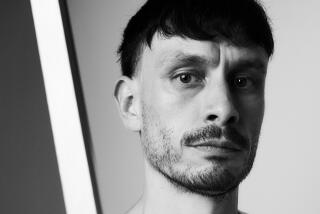For Depp, even a pirate has feelings
- Share via
It’s tempting, as some have done, to call Johnny Depp the king of the weirdo actors -- and heaven knows, with charmless, bizarro turns like his Michael Jackson-esque Willy Wonka, he has on occasion laid claim to the title. But if his performances were merely odd for oddness’ sake, like the dressed-up ham served by declining greats such as Marlon Brando or Rod Steiger, they wouldn’t connect so zingily with the audience. Throughout Depp’s career, his approach to acting has balanced fun and aesthetic risk-taking, outlandish imagination and emotional reality.
Anyone surprised at Depp’s outre buccaneer Jack Sparrow in his “Pirates of the Caribbean” movies probably never saw his astonishingly fey Ichabod Crane in Tim Burton’s 1999 movie “Sleepy Hollow.” As a progressive 1799 policeman exiled from New York and ordered to test his theories of deduction on a series of horrific beheadings, Depp combined intellect and swooning effeminacy to dazzling effect. He molded himself into a male ingenue who mixed the aura of a tortured poet with the unisex glamour of late Carnaby Street.
In interviews, he jokingly admitted that his version of Crane was “keenly in touch with his feminine side” and was less a traditional male hero than “a fragile young girl.” But, as with Sparrow (at least in the first “Pirates” movie), he brought this bizarre concoction an authority and humor that commanded respect. He knew (as he said in a 1999 news conference) that “even if you’re playing a heightened character and living inside a heightened reality, you can still apply your own truths to those characters.” Part of that meant that even if he wasn’t conventionally romantic, he still got the girl. It was Depp doing what he does best: trying to make an old character “interesting and different, and push him as far as you can go. Where you’re just on the verge of ‘believable’ and ‘not-so-believable,’ and quite possibly almost bad acting.”
For Crane, he listed half a dozen influences: the “energy and righteousness” of Angela Lansbury, the drive of Basil Rathbone’s Sherlock Holmes and the horror-movie posturing of Bela Lugosi, Boris Karloff, Peter Cushing and Christopher Lee.
But his primal approach to character went beyond these follow-the-dot connections. For Crane, he added “the ethereal quality” of his late friend Roddy McDowall, and tapped into his own melancholy as well.
Depp famously drew on Keith Richards for Sparrow -- and Richards will play Sparrow’s dad in the third “Pirates” movie. In the current Rolling Stone, Depp also credits his wide reading in pirate lore for some of Sparrow, such as a study called “Sodomy and the Pirate Tradition” (“I wasn’t exactly going for that with the character.... It was more that I liked the idea of being ambiguous”) and a book by a French sailor who said that he’d keep going as a sailor “because the horizon is always there.” In fact, he mined that idea for the first film’s last line, “Now, bring on that horizon.”
But Depp’s own funny-sadness percolated, albeit in a blissfully cartoonish way, throughout “Pirates of the Caribbean: Curse of the Black Pearl.” It inspired Orlando Bloom’s best moments, too: Learning Sparrow had been left in the hot sun on a desert island for days, Bloom mimicked Depp’s full range of woozy expressions and tottering steps. Suddenly, both Depp’s performance and Bloom’s made sense: If Bloom’s straight arrow Will Turner could empathize with Sparrow as damaged goods, perhaps he was man enough for Keira Knightley’s feisty Lizzie. It’s that kind of connection that’s completely lost in the overscaled high jinks of “Dead Man’s Chest.”
In his own burlesque fashion, Sparrow represents not just the charming rogue, but the cagey fighter fearlessly coming back from a rocky past -- like Depp himself, who confessed to Rolling Stone, “When I was a kid, my parents went through a nasty divorce and [drugs] was the direction I went in for a while. At the time, it was more self-medicating. It never had anything to do with fun for me.”
When I read that, something tingled in the back of my mind. I remembered Depp uses the same words on the DVD of “The Libertine” to describe the alcoholism of the debauched antihero he plays in that wretched movie: It’s “self-medication,” not “fun.” As an insight into a certain kind of addiction, it isn’t earth shattering, but as a sign of an actor’s ability to expose an intimate part of his personal history in even the most far-out characterization, it’s tremendously moving.
*
Michael Sragow is a film critic for the Baltimore Sun, a Tribune company.
More to Read
Only good movies
Get the Indie Focus newsletter, Mark Olsen's weekly guide to the world of cinema.
You may occasionally receive promotional content from the Los Angeles Times.








